Havel Prize Awarded to Dissident Iranian Rapper Toomaj Salehi
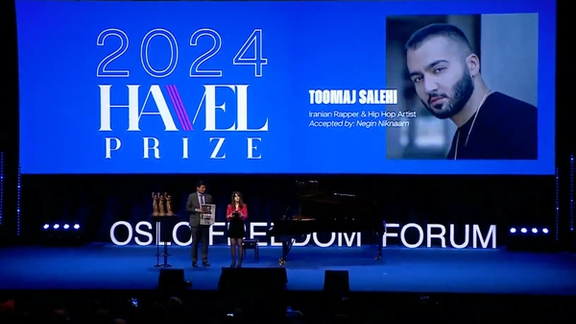
Imprisoned Iranian rapper Toomaj Salehi, who has been sentenced to death, was awarded the Václav Havel International Award at the 16th Oslo Freedom Forum in Norway's capital on Tuesday.

Imprisoned Iranian rapper Toomaj Salehi, who has been sentenced to death, was awarded the Václav Havel International Award at the 16th Oslo Freedom Forum in Norway's capital on Tuesday.
Salehi, an outspoken critic of the Islamic Republic, was one of the three winners of the award alongside Uyghur poet and filmmaker, Tahir Hamut Izgil and Venezuelan pianist and recording artist, Gabriela Montero.
Unable to attend the ceremony due to his imprisonment in Iran’s Dastgerd Prison in Esfahan, Salehi's award was accepted on his behalf by Iranian activist and friend, Negin Niknaam. Niknaam delivered a poignant speech, highlighting Salehi's plight and the broader struggle for freedom in Iran.
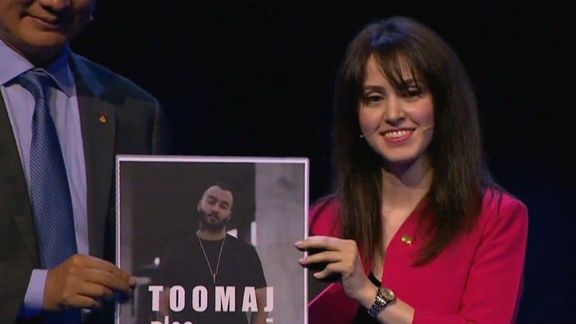
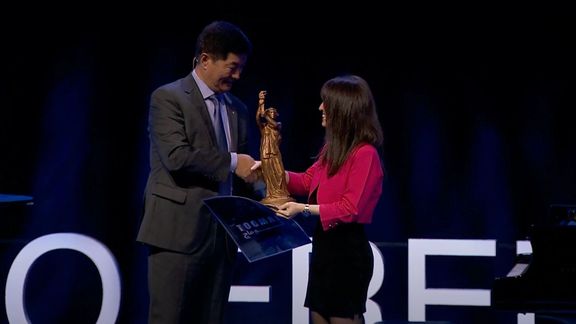
"Toomaj is not here. He cannot be here today. He sits in prison behind cold bars in Iran and is sentenced to death. The Islamic Republic wants to execute him. Why? Because he is much more than a musician. He is a beacon of hope, a symbol of resistance," Niknaam stated.
Salehi was charged with "corruption on Earth" by a court in Esfahan, after facing lesser charges. Niknaam stated that this charge “reflects the regime's fear of the courage and hope” that Salehi represents through his art.
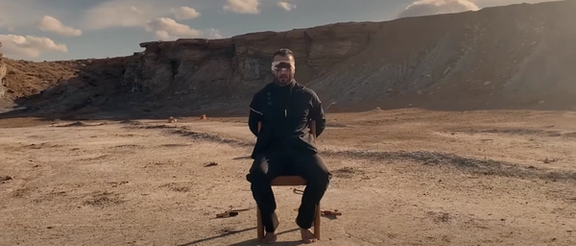
Salehi’s lawyer Amir Raisian confirmed the verdict of Salehi’s death sentence in April this year. Salehi who became an icon of Iran’s 2022 nationwide protests, released a song in support of the protestors in addition to lending his platform to echo the voices of Iranian protestors. He not only supported the protests in this manner but also joined them on the streets of Iran as security forces fired shots at peaceful protestors across the country.
This ultimately made him a target of the authorities and led to his violent arbitrary arrest, torture, imprisonment, and now a death sentence following sham trials without legal due process.
"The Islamic Republic wants to execute him because he has become the voice of a nation, yearning for freedom like the brave injured protestors…like those whose children were shot during the protests…like those brave women and men who drew their last breaths under the brutality of the security forces," Niknaam continued.
Further shedding light on the plight of Iranians, Niknam stated “despite the crackdowns, imprisonment, and executions, the movement for freedom in Iran continues to gain strength…”. However, she warned that the lack of inaction from Western countries only emboldens the regime to continue its repression, encouraging “the Islamic Republic to kill more protestors”.
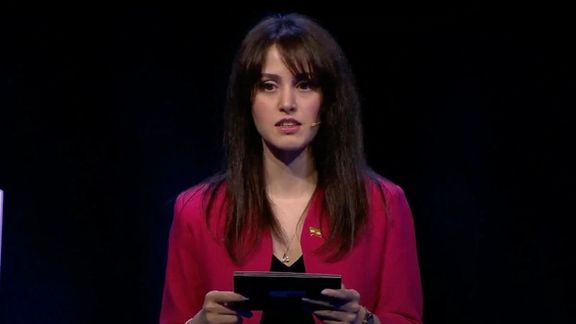
Niknaam urged the event’s attendees to raise their voices to support Toomaj until his release and emphasized that the Islamic Republic regime sometimes falls short in the face of international pressure.
Niknaam concluded her speech by echoing Salehi's words which became viral among young Iranians: "The ultimate death is the death of hope."
Salehi's cousin, Arezou Babadi, spoke to Iran International following the event, emphasizing the global impact of his courage.
"Toomaj’s unwavering courage and voice have transcended borders, making him a global icon of freedom of expression and resistance. Toomaj stands as a beacon for the voiceless, embodying the relentless pursuit of truth and justice in a world often shrouded in silence," Babadi stated.
During the past weeks, hundreds of family members of the dead and wounded in the Iran-Iraq war, civil activists, and cultural and artistic figures around the world, in separate statements, demanded the release of Salehi.
Shortly after Niknaam’s speech, Jack Dorsey, the co-founder of Twitter took to social media and wrote #FreeToomaj shortly after Niknaam’s speech.
The Václav Havel International Award recognizes those who demonstrate exceptional courage and creativity in standing up to tyranny. The Havel Prize is named after the late Czech president and former New York-based nonprofit Human Rights Foundation chairman, Václav Havel. Havel is remembered for his struggles against the communist government of Czechoslovakia. He was elected as the first Prime Minister of the Czech Republic and held power in this country from 1993 to 2003. He died in 2011.
Further reflecting on Salehi’s award following her speech, Niknaam told Iran International English:
“Toomaj's unwavering commitment to his cause makes him a deserving recipient. Toomaj’s plight and the ongoing struggle of the Iranian people serve as a powerful reminder to the world of the resilience and strength required to fight for freedom.”